Coordinación
Una coordinación sólida puede evitar vacíos y duplicaciones en las respuestas humanitarias, así como garantizar que los PTM complementen otros tipos de asistencia. Sin embargo, el informe del «Estado Global de los Programas de Transferencias Monetarias» de la CALP Network muestra que la coordinación de la asistencia en efectivo es vista como débil y ad hoc, y que esto está teniendo graves repercusiones operativas.
Los donantes, las ONG y los líderes de los grupos de trabajo de transferencias monetarias (GTM) han pedido claridad sobre tres temas principales relacionados con la coordinación de la asistencia en efectivo:
- Quién debe ser responsable de asegurar una coordinación eficaz de la asistencia en efectivo;
- Cuál es la función y el mandato de los grupos de trabajo de transferencias monetarias, incluso en relación con las transferencias monetarias multipropósito;
- Cómo se debe dotar de recursos a la coordinación de asistencia en efectivo.
Tenemos que basarnos urgentemente en lo que funciona y proporcionar claridad a nivel mundial sobre las preguntas arriba mencionadas, adaptándonos a los diferentes contextos. Hace mucho tiempo que se deberían haber tomado decisiones claras basadas en necesidades operativas y no en la política de las agencias.
Prioridades actuales
El objetivo de la CALP Network es contribuir a seguir progresando en este tema en tres niveles: apoyar a los grupos de trabajo de transferencias monetarias a nivel regional; contribuir a soluciones prácticas para la coordinación de la asistencia en efectivo a nivel mundial; y convocar una discusión basada en la evidencia sobre temas clave, destacando puntos de decisión críticos y oportunidades de progreso.
Contenido destacado

Cash Coordination Tip Sheet
Guidelines and Tools
This tip sheet sets out established best practice, key guidance and resources for all aspects of cash coordination, intended as a clear, accessible and action-oriented guide for those engaged in coordination of cash and voucher assistance (CVA) at the field level.

Introducing the Cash Coordination Tip Sheet
Webinar
The CALP Network has developed a tipsheet setting out established best practice and key guidance and resources for all aspects of cash coordination, intended as a clear, accessible and action-oriented guide for those engaged in coordination of cash and voucher assistance at the field level.

Cash Coordination: A proposal from members in MENA
Blog Post
Earlier this year the CALP Network undertook regional consultations to explore options for cash coordination. This blog lays out recommendations from participants from the Middle East and North Africa who sketched out what cash coordination, and coordination more broadly, could look like in future to support a more effective, efficient and accountable response.
Últimos recursos
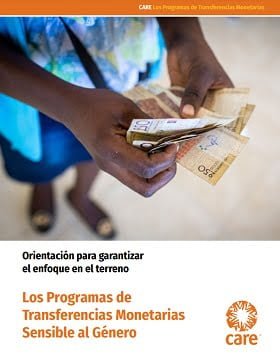
Los Programas de Transferencias Monetarias Sensible al Género : Orientación para garantizar el enfoque en el terreno
Guía y herramientas
Esta orientación promueve la ambición de CARE a través de la práctica, la investigación y la evidencia sobre el PTM: su propósito es la aplicación del PTM sensible al género durante el ciclo del proyecto y en el nivel de respuesta. Se divide en dos apartados: Apartado A: “¿Qué se ha aprendido...

Use of Cash and Voucher Assistance for Health Services
Guidelines and Tools
The use of Cash and Voucher Assistance (CVA) as a modality for providing humanitarian assistance has expanded rapidly in recent years. Arguments for the use of CVA to address several needs and facilitate people’s access to them include greater flexibility, cost-efficiency and dignity. There is extensive...

Role of Cash & Voucher Assistance for Health Outcomes: Using the Health Barriers Framework to Determine the Appropriate Response
Guidelines and Tools
The guidance note introduces the barriers framework for assessing barriers to health, as well as response options to addressing these barriers including Cash and Voucher Assistance. The note is intended to support cash and health practitioners in considering Cash and Voucher Assistance (CVA) options...

Cash and Voucher Assistance and Gender-Based Violence Compendium and Editable Risk Matrix Translations
Guidelines and Tools
This brief serves as a complementary document to the Cash & Voucher Assistance and Gender- Based Violence Compendium: Practical Guidance for Humanitarian Practitioners and is intended to be a reference guide delineating sections, features, and new tools. In addition, it provides the respective links to...
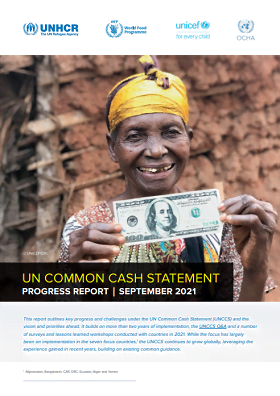
UN Common Cash Statement Progress Report – September 2021
Report
This report outlines key progress and challenges under the UN Common Cash Statement (UNCCS) and the vision and priorities ahead. It builds on more than two years of implementation, the UNCCS Q&A and a number
of surveys and lessons learned workshops conducted with countries in 2021. While the focus has...
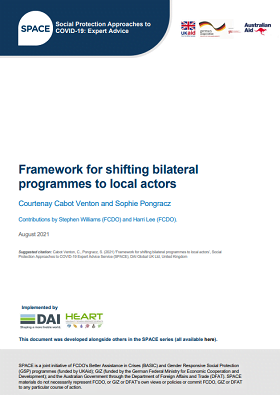
SPACE Framework for shifting bilateral programmes to local actors
Guidelines and Tools
This document presents an initial framing developed to support analysis of separation of functions, Value for Money and risk, to help facilitate a shift from UN/INGO led programmes, to locally-led models that draw on the complementarities between UN, INGO and LNO key strengths. It also reports on the...

SPACE Direct support to local actors: considerations for donors
Guidelines and Tools
The COVID-19 crisis has highlighted the critical role of local actors, including governments, and local and national NGOs, in the design and delivery of programming. Movement restrictions and a rapid scale-up of humanitarian and social protection assistance to new populations have driven a greater focus...
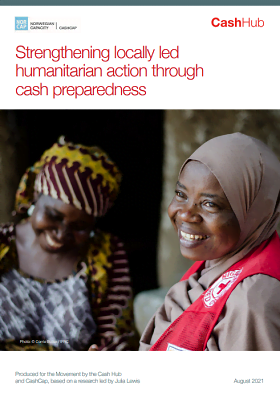
Strengthening locally led humanitarian action through cash preparedness
Report
This research, produced by the Red Cross and Red Crescent Movement’s Cash Hub and CashCap, looks at the links between CVA and localisation to understand how cash, and cash preparedness, can help to further localisation and strengthen locally led humanitarian action. It examines three questions: 1) How...
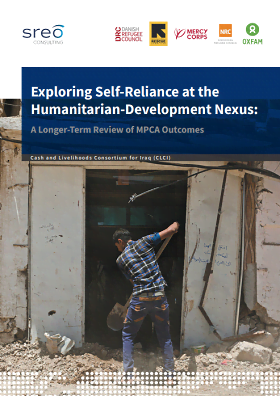
Exploring Self-Reliance at the Humanitarian-Development Nexus: A Longer-Term Review of MPCA Outcomes
Report
Multi-Purpose Cash Assistance (MPCA) is provided to extremely socio-economically vulnerable individuals to alleviate financial hardship. In Iraq, MPCA is intended to act as temporary consumption support so that households may eventually be linked with social protection assistance or return to...

Gender Analysis of Livelihoods Programming and Individual, Household and Community Dynamics in Iraq
Report
Women throughout the world are constrained in their economic activities, and face major challenges trying to pursue better paid and more productive jobs, including in Iraq. Iraq is in a time of change after ISIS and in light of the pandemic. Though economic upheaval brings hardship, it also can open doors...
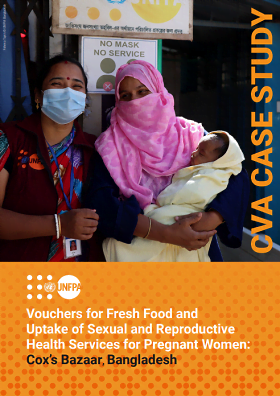
Vouchers for Fresh Food and Uptake of Sexual and Reproductive Health Services for Pregnant Women: Cox’s Bazaar, Bangladesh
Report
UNFPA found that facility-based deliveries by women in refugee camps in Cox’s Bazaar were low (35%), which is linked to increased maternal mortality. In addition, undernourishment among pregnant women in this community increased their risk of poor pregnancy outcomes such as obstructed labor and...
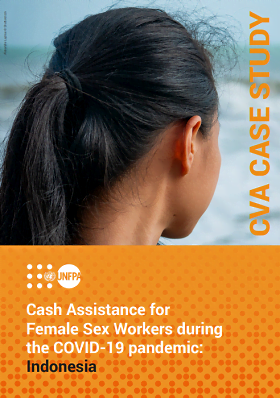
Cash Assistance for Female Sex Workers during the COVID-19 pandemic: Indonesia
Report
The COVID-19 pandemic heavily impacted sex workers in Indonesia: their incomes decreased dramatically, they encountered greater difficulty accessing healthcare, and many of them could not access the government cash assistance that was set up to help Indonesians during the pandemic. This CVA pilot provided...
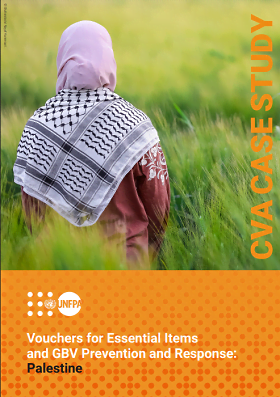
Vouchers for Essential Items and GBV Prevention and Response: Palestine
Report
The COVID-19 pandemic increased the risk of gender-based violence (GBV) for women and girls in Palestine. Women reported to UNFPA that diminished economic opportunities and financial stress significantly contributed to this increased risk. In response, UNFPA provided vouchers to respond to the urgent...
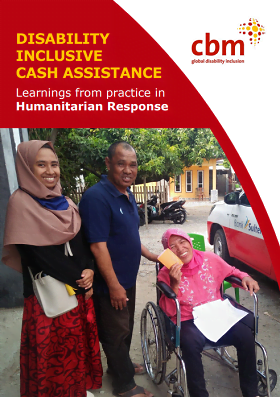
Disability Inclusive Cash Assistance: Learnings from Practice in Humanitarian Response
Guidelines and Tools
This case study collection describes lessons learned from seven inclusive humanitarian cash transfer projects implemented from 2015 – 2020 in Niger, Zimbabwe, Pakistan, Bangladesh, Philippines, and Indonesia, and five ongoing projects from the 2020 Covid-19 pandemic responses. This good practice...
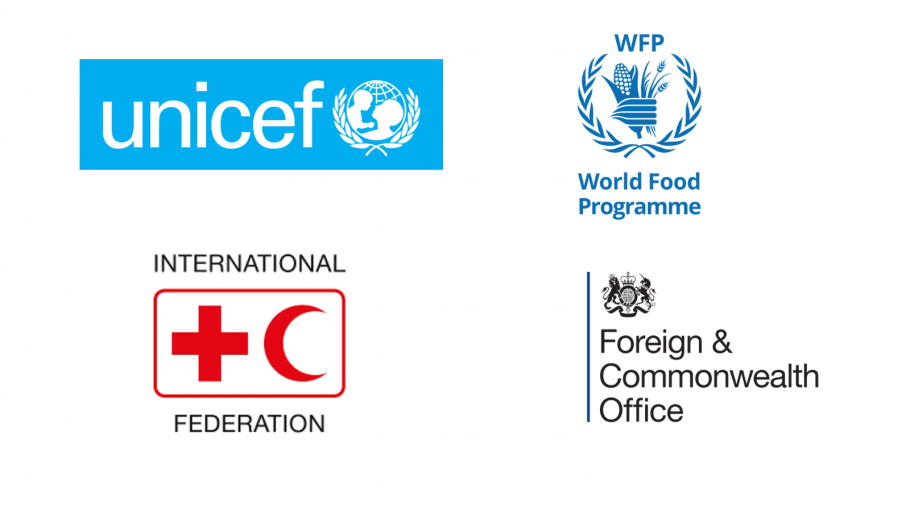
Changing the mindset – turning theory into practice: Incorporating gender-sensitivity into linked humanitarian cash and social protection interventions
Members event
This is one of a series of webinars organised by the Grand Bargain Cash Sub Group, co-led by IFRC, UNICEF and FCDO to engage humanitarian actors with social protection by exploring the linkages between the two agendas and the design and implementation of Cash and Voucher Assistance (CVA).

Data Protection Awareness Symposium: A collaborative Event with the Data Commissioner
Members event
In partnership with the Kenya Red Cross Society & the Office of the Data Protection Commissioner, we are inviting you for a Data Protection Symposium to raise awareness among humanitarian organizations and other actors on personal data protection principles as applied in humanitarian activities.
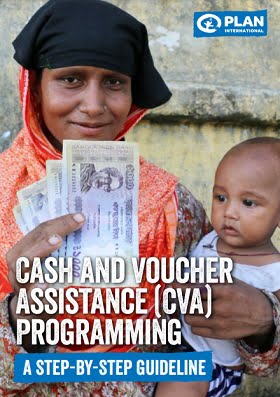
Cash and Voucher Assistance (CVA): A Step by Step Guidelines
Guidelines and Tools
The purpose of this guideline is to increase knowledge around CVA in applying the CVA approaches wherever appropriate, instead of referring to traditional in-kind assistance. It refers to the technical concept of CVA as well as to the operational management of CVA components. Trends and perspectives of...

We Don’t Do a Lot for Them Specifically
Report
Cash based assistance is a large part of government and NGO responses to social protection needs during the COVID-19 crisis. But is this assistance reaching people with diverse SOGIESC (aka LGBTIQ+ people). There are clear needs, borne of systemic discrimination, including loss of informal sector work,...

We Don’t Do a Lot for Them Specifically – Quick Guide
Report

A Gendered Analysis on Cash for Work Programming in Hudayda
Case Study
The Swedish International Development Agency (Sida) funded Cash for Work programme in Yemen focuses on the Food Security and Livelihoods (FSL) and WASH sectors to build upon Islamic Relief Yemen’s previous programming and work with local communities in the targeted areas of Hudayda and Lahj. This study...